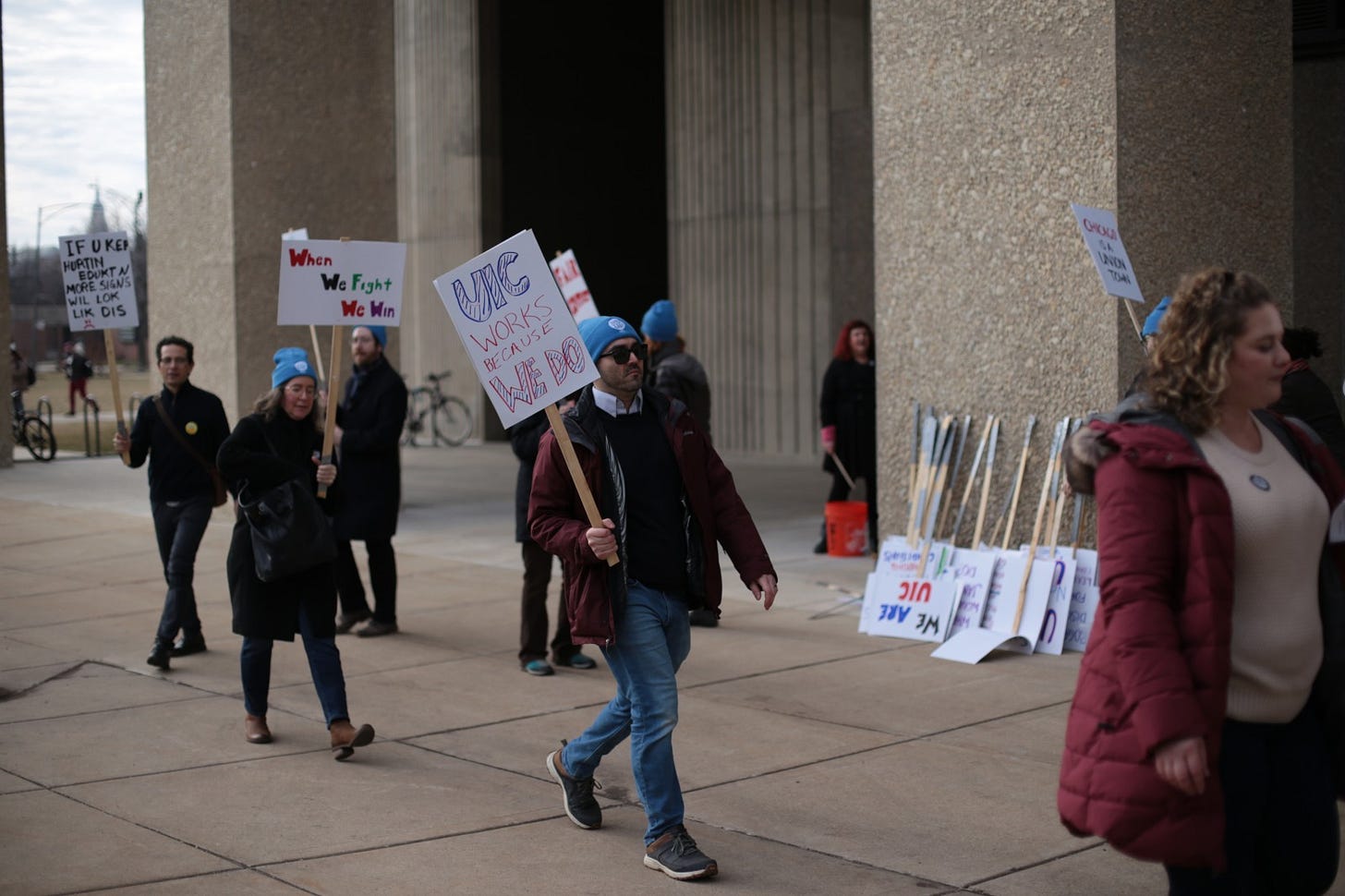Editor’s note: We’re coming to you a few hours later in the week than normal thanks to my trip to Washington, D.C. for the March for Life. Read my thoughts on abortion policy in a post-Dobbs America below. Above, watch Pastor Chris Butler’s analysis of last night’s League of Women Voters mayoral debate. — Mike Vick
The Round Up
Here are the stories that caught our eyes this week and what they mean for the weeks ahead.
Rep. Jonathan Jackson endorses mayoral challenger Brandon Johnson
Newly elected U.S. Rep. Jonathan Jackson endorsed mayoral challenger Brandon Johnson Monday, buoying Johnson’s campaign.
Jackson said he has “enormous respect” for fellow Rep. Jesus “Chuy” Garcia, citing Garcia’s late entry in the race left him in a difficult spot, given the endorsement of the Chicago Teachers Union.
After 12-hour bargaining session and months of negotiations, UIC faculty to strike
After nine months of talks and a half-day bargaining session Monday, faculty at the University of Illinois Chicago voted to strike Tuesday when the union representing faculty and university leadership failed to reach an agreement. A union representative said issues included compensation.
“The campus is thriving, but many faculty are not,” Nicole Nguyen, Associate Professor in Criminology, Law, & Justice and a member of the UIC United Faculty (UICUF) bargaining team said in a release announcing the strike. “We have spent the past three years scrambling to mitigate the effects of the pandemic, and our whole community--students and faculty--are exhausted. Management needs to invest in resources that strengthen our entire community.”
Chicago will get $20 million from the state of Illinois from an appropriation bill passed by the state legislature for migrants. That’s half of what Mayor Lori Lightfoot wanted to address a recent rush of migrants.
Migrants disembark a CTA shuttle bus that reads “My Kind of Town” at Chicago’s Union Station after a 25-hour-long ride from Texas Sept. 9. Credit: Colin Boyle/Block Club Chicago
At her post-City Council meeting news conference Wednesday, Lightfoot said the city is taking a “wait-and-see” approach.
The measure, which still has to be signed by Gov. J.B. Pritzker, also includes $90 million for state welcoming centers for immigrants and refugees.
Newsclips
Illinois Gaming Board OKs gaming license for clout-heavy lawyer James J. Banks in an about-face
Chicagoan awarded high honors from France for work rebuilding Notre Dame Cathedral ravaged by fire
Amtrak is eyeing new rail cars for long-distance trains through Chicago
As book bans rise, Chicago-area libraries fight to protect access to reading materials
Want to end abortion? Tackle the reasons women choose it.
Even in states captured by pro-abortion extremists, pro-life advocates can make abortion unnecessary by making the choice for life the easiest one a new mother ever had to make.
By Mike Vick
On Friday, Illinois Gov. J.B. Pritzker made good on his promise to make Illinois a “safe haven” for abortion by signing into law a bill that makes Illinois among the friendliest states for abortion extremism.
Last week, I detailed the dire position in which the state now finds itself, and I offered an independent path to shake up the electorate in this and any other blue state facing a similar uphill battle for life.
This week, I want to point readers to goals pro-life activists in that electorate can set as guideposts as we chart a better way forward on abortion.
First, as this legislation and the margins by which it passed makes painfully clear, the state legislature rests firmly in the hands of social liberals beholden to the abortion industrial complex. Pro-life voters in Illinois, be they Democrats, Republicans or independents, have no path to secure curb abortion on the supply side.
So, what can be done on the demand side? In order to answer this question, we must first figure out what factors precipitate the decision for abortion.
In a 2004 survey, the pro-choice Guttmacher Institute found that the most common reason post-abortive women cited were that having a child would interfere with her education, her work or her ability to care for dependents. Very nearly as many women said they could not afford a baby. Close to half said they did not want to be a single mother or were having relationship problems.
Each of these reasons provide avenues for solutions, but it’s also important to remember that nearly nine in ten women gave at least two reasons, and nearly three in four gave at least three. The median number of reasons was four, and some women gave as many as eight out of a possible 13 reasons the study probed.
The most common paired reasons were the inability to afford a baby and interference with school or work, followed by inability to afford a baby coupled with concerns that having another child would negatively impact the woman’s ability to care for other dependents.
After years of activist work to push for workplace fairness, last year, Congress finally passed the Workers Fairness Act, which prohibits employment practices that discriminate against making reasonable accommodations for pregnant women and new mothers. Congress also passed the PUMP Act, which provides protections for employees with a need to express breast milk.
These protections should extend to educational environments as well. We need a society that welcomes pregnant women, new mothers and their babies. No woman should feel pressured to kill her own child as a precondition to full participation in society.
Pro-life conservatives would also do well to ditch Republican orthodoxy when it comes to health care policy. One of the obvious reasons women feel they cannot afford to have a child is the exorbitant price of having a child at all, let alone the cost of raising a child.
As a model, pregnancy resource centers should certainly get additional funding. The advantage of this route is that it does not require any new legislation. In an interview on the American Solidarity Party’s official podcast, The Pelican Brief, pro-life researcher Dr. Michael New cited the growth of crisis pregnancy centers as a key victory of the pro-life movement. Between 1988 and 2017, the number of organizations offering pregnancy help has gone up by 80 percent. State legislatures can allocate funds to these groups, and provide tax credits and government grants, but this is virtually impossible to envision passing in a blue state like Illinois.
So, we must move beyond ad-hoc, private endeavors. In a July 2022 op-ed, progressive pro-life advocate and columnist Elizabeth Bruenig argues that the pro-life movement must make its next step ensuring that giving birth is free. Expanding Medicare to cover pregnancy, birth and infant care should be the immediate goal of anyone who claims the mantle “pro-life”. In this, the pro-life movement would have allies among progressive Democrats looking for a win on health care expansion.
We would also do well to look to our pews for help. If thousands upon thousands of pro-life pastors told their millions upon millions of congregants that it is their moral duty to gather the funds necessary to pay for housing and health care for women who feel their economic conditions have compelled them to choose abortion, how many abortions do you think we could prevent? Probably a lot.
If we went further and had a million Christian parents say collectively, “We will adopt the children if you do not feel you can raise them,” how many more could we save?
None of this is happening in any particularly organized manner. But it should be. It would save lives and it doesn’t require any new law.
In the final analysis, beyond rhetoric and even greatly beneficial economic policies, as a Christian, I posit it is evangelism, not politics, that will ultimately drive down demand for abortion.
Too many politically conservative Christians have made an idol out of politics, focusing more on changing laws than on changing hearts. We cannot expect the world to act like they believe in the Bible simply because we legislate their activity. They’re not believers. Evangelize them. That’s our first, last and best hope in all circumstances.
I write this op-ed from Washington, D.C., where I’m meeting with thousands of fellow pro-life advocates for the March for Life. In this first year post-Dobbs, the pro-life movement needs a reset, and refocused attention not merely on making abortion illegal – efforts that must continue apace – but also on making abortion completely unnecessary and therefore unthinkable.
By examining the underlying causes and dealing with them holistically, we can move forward even in states like Illinois, where traditional pathways to create a culture of life are all but closed to us.
Do you have ideas for future Civic Update stories or want to contribute a story yourself? Email our editor by clicking the button below!











